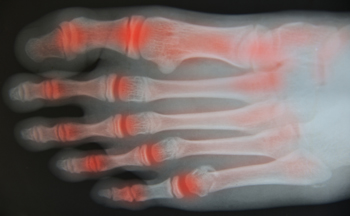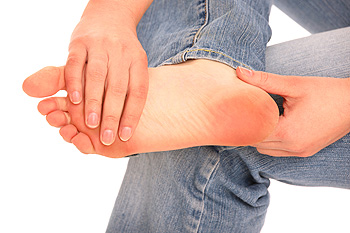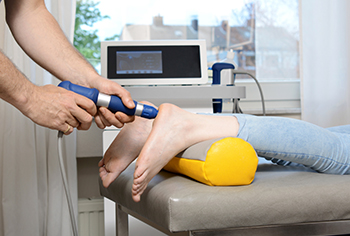Items filtered by date: December 2021
Can Osteoarthritis Occur in the Ankles?
Osteoarthritis in the ankles is a very painful condition which causes the cartilage that protects bones in the ankle to deteriorate. This leads to bones rubbing against each other, swelling, stiffness, tenderness and intense pain in the ankle, and a decreased ability to walk or bend and flex your ankles. Several factors can increase your risk of developing osteoarthritis (OA) in the ankles, such as previous ankle injuries, recurrent high-impact stress on the ankles, misaligned joints, genetics, obesity and age. Your podiatrist can diagnose OA with a physical exam to test joint tenderness and swelling, X-rays, a gait analysis to assess your stride and foot and ankle biomechanics, and blood tests to distinguish OA from other forms of arthritis. There are many ways a podiatrist can help you manage the symptoms of OA, from lifestyle changes and physical therapy to various braces and orthotic devices, topical creams, pain relievers, and steroid injections. In severe cases of OA, surgery may be beneficial to remove spurs and loose cartilage, fuse the ankle to reduce pain, or replace damaged cartilage and bone with prosthetic parts (arthroplasty). If you believe you may have osteoarthritis in the ankle, it is suggested that you make an appointment as soon as possible to begin treatment.
Arthritis can be a difficult condition to live with. If you are seeking treatment, contact Dr. Mark Gagnon from Advanced Podiatry. Our doctor can provide the care you need to keep you pain-free and on your feet.
Arthritic Foot Care
Arthritis is a term that is commonly used to describe joint pain. The condition itself can occur to anyone of any age, race, or gender, and there are over 100 types of it. Nevertheless, arthritis is more commonly found in women compared to men, and it is also more prevalent in those who are overweight. The causes of arthritis vary depending on which type of arthritis you have. Osteoarthritis for example, is often caused by injury, while rheumatoid arthritis is caused by a misdirected immune system.
Symptoms
- Swelling
- Pain
- Stiffness
- Decreased Range of Motion
Arthritic symptoms range in severity, and they may come and go. Some symptoms stay the same for several years but could potentially get worse with time. Severe cases of arthritis can prevent its sufferers from performing daily activities and make walking difficult.
Risk Factors
- Occupation – Occupations requiring repetitive knee movements have been linked to osteoarthritis
- Obesity – Excess weight can contribute to osteoarthritis development
- Infection – Microbial agents can infect the joints and trigger arthritis
- Joint Injuries – Damage to joints may lead to osteoarthritis
- Age – Risk increases with age
- Gender –Most types are more common in women
- Genetics – Arthritis can be hereditary
If you suspect your arthritis is affecting your feet, it is crucial that you see a podiatrist immediately. Your doctor will be able to address your specific case and help you decide which treatment method is best for you.
If you have any questions, please feel free to contact one of our offices located in Crestwood, Orland Park, and Summit, IL . We offer the newest diagnostic and treatment technologies for all your foot care needs.
What Causes a Swollen Ankle?
When your ankle appears to be larger than normal it may be an indication of fluid retention or an injury. The skin becomes tight and stretched out, and the area may be painful, especially when standing or walking. Causes of swelling may include being overweight, poor circulation, pregnancy, blood clots, arthritis, or injury. Taking certain prescription medication can also be a causative factor. Swelling in the leg or ankle could be caused by inflammation from an injury such as an ankle sprain, a broken bone, a ruptured tendon, or torn ligament. Mild swelling or edema can be caused by pregnancy, premenstrual cramps, consuming too much salt, or standing for extended periods of time. If your ankle is swollen or painful, it is suggested to consult with a podiatrist as soon as possible for a full diagnosis and appropriate treatment plan.
Ankle pain can be caused by a number of problems and may be potentially serious. If you have ankle pain, consult with Dr. Mark Gagnon from Advanced Podiatry. Our doctor will assess your condition and provide you with quality foot and ankle treatment.
Ankle pain is any condition that causes pain in the ankle. Due to the fact that the ankle consists of tendons, muscles, bones, and ligaments, ankle pain can come from a number of different conditions.
Causes
The most common causes of ankle pain include:
- Types of arthritis (rheumatoid, osteoarthritis, and gout)
- Ankle sprains
- Broken ankles
- Achilles tendinitis
- Achilles tendon rupture
- Stress fractures
- Bursitis
- Tarsal tunnel syndrome
- Plantar fasciitis
Symptoms
Symptoms of ankle injury vary based upon the condition. Pain may include general pain and discomfort, swelling, aching, redness, bruising, burning or stabbing sensations, and/or loss of sensation.
Diagnosis
Due to the wide variety of potential causes of ankle pain, podiatrists will utilize a number of different methods to properly diagnose ankle pain. This can include asking for personal and family medical histories and of any recent injuries. Further diagnosis may include sensation tests, a physical examination, and potentially x-rays or other imaging tests.
Treatment
Just as the range of causes varies widely, so do treatments. Some more common treatments are rest, ice packs, keeping pressure off the foot, orthotics and braces, medication for inflammation and pain, and surgery.
If you have any questions, please feel free to contact one of our offices located in Crestwood, Orland Park, and Summit, IL . We offer the newest diagnostic and treatment technologies for all your foot care needs.
What Is Capsulitis?
There are ligaments that form a “capsule” around the joint at the base of a toe. These ligaments can become inflamed, which is known as capsulitis. This condition typically occurs in the second toe, although it can sometimes affect the third and fourth toes. Capsulitis is believed to be a reaction to dysfunctional foot mechanics that put an excessive amount of pressure on the ball of the foot beneath the second toe. Severe bunion deformity, an unstable arch, tight calf muscles, and having a second toe that is longer than the big toe can all contribute to this condition. Capsulitis can make it difficult to wear shoes or walk barefoot. Additionally, there may be pain and swelling in the ball of the foot and at the base of the toe. A sensation of walking on a marble may also be present, similar to another condition known as Morton’s neuroma. It is important to have a podiatrist properly diagnose and treat this condition in its early stages when it can still be treated conservatively, to stabilize the toe and avoid it from drifting towards the big toe.
Foot Pain
Foot pain can be extremely painful and debilitating. If you have a foot pain, consult with Dr. Mark Gagnon from Advanced Podiatry. Our doctor will assess your condition and provide you with quality foot and ankle treatment.
Causes
Foot pain is a very broad condition that could be caused by one or more ailments. The most common include:
- Bunions
- Hammertoes
- Plantar Fasciitis
- Bone Spurs
- Corns
- Tarsal Tunnel Syndrome
- Ingrown Toenails
- Arthritis (such as Gout, Rheumatoid, and Osteoarthritis)
- Flat Feet
- Injury (from stress fractures, broken toe, foot, ankle, Achilles tendon ruptures, and sprains)
- And more
Diagnosis
To figure out the cause of foot pain, podiatrists utilize several different methods. This can range from simple visual inspections and sensation tests to X-rays and MRI scans. Prior medical history, family medical history, and any recent physical traumatic events will all be taken into consideration for a proper diagnosis.
Treatment
Treatment depends upon the cause of the foot pain. Whether it is resting, staying off the foot, or having surgery; podiatrists have a number of treatment options available for foot pain.
If you have any questions, please feel free to contact one of our offices located in Crestwood, Orland Park, and Summit, IL . We offer the newest diagnostic and treatment technologies for all your foot care needs.
What Is Extracorporeal Shock Wave Therapy (ESWT)?
In Extracorporeal Shock Wave Therapy (ESWT), a handheld device sends a series of acoustic pulses through the surface of the skin to an area of damaged tissue. This intense energy creates a microtrauma in the injured tissue, causing the body to respond by increasing blood circulation and metabolism. This accelerates the body’s natural healing response, helps the body to produce new cells, and reduces pain. Shockwave therapy is a non-invasive treatment with minimal side effects. The treatments only take a couple of minutes and are usually administered once a week for 3-4 weeks or more, depending on the level of damage/pain and how long it has been present. Shockwave therapy can be very effective in the treatment of plantar fasciitis, Achilles tendinopathy, and more. Contact your podiatrist to see if your condition may be treated with ESWT.
Shockwave therapy is a treatment commonly used to treat various injuries and conditions, particularly plantar fasciitis in the feet. To learn more, consult with Dr. Mark Gagnon from Advanced Podiatry. Our doctor can provide the care you need to keep you pain-free and on your feet.
Shockwave Therapy
Shockwave therapy is a new treatment option designed to treat bone conditions such as tennis elbow, shoulder pain, and others. Shockwave therapy uses high intensity sound waves that are directed to the affected tissues of the body with pinpoint accuracy. The effects are very beneficial, leading to a production of collagen fibers, eliminating inflammation.
Who Benefits from Shockwave?
Shockwave is recommended for patients suffering from heel pain and associated problems. Heel pain is a common condition which can be caused by obesity, overexertion, and spending a substantial amount of time on hard floors with your feet exposed and unsupported.
Fast and Easy
The therapy is actually a simple process that can leave patients feeling better the very next day. Shockwave therapy is not as dramatic as it sounds. It enables more blood flow to effected areas, addressing the source of the problem and allowing treatment to last for a long time.
Treatment & Recovery Time
Shockwave treatment will enable your feet to recover quickly. This is especially important since surgery is not required. It is cost effective and does not require the use of anesthesia. This treatment is a better option to surgery, since it is proven safe.
If you have any questions, please feel free to contact one of our offices located in Crestwood, Orland Park, and Summit, IL . We offer the newest diagnostic and treatment technologies for all your foot and ankle needs.





